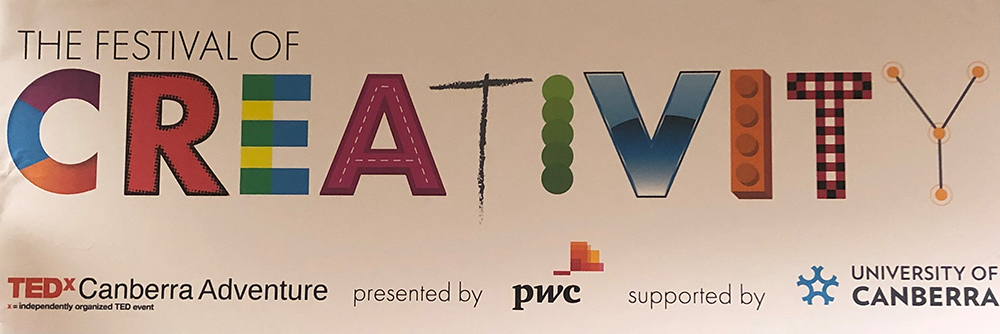Tara Corcoran
18 April 2019: Data modelling using Play-Doh and art, poetry and writing exercises and design thinking toolkits were just some of the workshops run by the University of Canberra’s Faculty of Arts and Design academics, PhD and undergraduate students and affiliates at the Festival of Creativity last week.
The Faculty, including its Centre for Creative and Cultural Research, partnered with PwC for the Festival of Creativity, a TEDx Canberra Adventure, to explore the role of creativity, play and art in problem solving in business and life. Over 130 participants from government, the private sector and the community interacted with faculty academics and students as they shared their diverse research and expertise in highly interactive workshops and presentations.

PwC’s Chief Creative Officer, Russel Howcroft, explains the value of creativity as ‘a key driver of commercial competitiveness and edge’ in the new economy.
“We need to find a way for creativity’s power to be front and centre in our economy.
“It is core to the way we develop and support ideas, find commercial opportunities, create business models and build relationships with consumers,” Mr Howcroft said.
Faculty presenters included Assistant Professor Denise Thwaites, Assistant Professor Dr Fanke Peng, Industrial Design student and Stanford University Fellow Amannda Huot, Senior Fulbright Fellow Professor Marianne Boruch, PhD candidate Louise Curham, and Visiting Fulbright Fellow Dr Michael Socolow.
Denise Thwaites – Plastic Data
Denise Thwaites and academic Baden Pailthorpe (ANU) took participants through a Play-Doh data visualisation inspired by an artistic project using AFL game data, leading a mind-expanding discussion on how to synthesise and present data in meaningful ways. Denise is an Assistant Professor in the Faculty, teaching into the Bachelor of Arts and specializing in Digital Arts and Humanities. Her current research explores forms of decentralisation across the arts, technology and the medical imaginary, as well as the impact of technologies such as AR and VR upon perceptual frames of inclusion and exclusion.
Amannda Huot – Design Thinking Toolkit
As a third-year industrial design student with a passion for social justice, Amannda ran an engaging workshop on the Design Thinking Toolkit, taking participants through ways in which they could embrace and enable design thinking in their everyday work. As the University of Canberra’s first University Innovation Fellow, Amannda spent time at Stanford University’s prestigious Hasso Plattner Institute of Design and learned about design thinking, including methods of identifying problems and prototyping solutions within a team.
Dr Fanke Peng – Co-Design for Health, using design thinking methods and tools
As well as founding the Cross-Cultural Design Lab, Dr Fanke Peng is an Assistant Professor and Course Leader of the Master of Design Strategies at the University of Canberra. Dr Peng’s research focus is on social design, digital health, design strategy, design thinking and digital fashion communication.
With her Festival of Creativity workshop, Dr Peng posed the question: How can design contribute to addressing and improving global health? The approach includes bringing together multi-disciplinary groups of creative thinkers and applying a design thinking process, to attempt to find practical solutions to complex global issues. Dr Peng demonstrated how convergent thinking and divergent thinking coexist in the design process for creativity.
Louise Curham – Doing knowledge
Louise currently holds a position in the Faculty’s Centre for Creative and Cultural Research, is an archivist in the Australian Government and is also an artist who specialises in obsolete technology. Louise’s PhD research draws together art and archives, exploring how we keep things we can’t digitise.
In her workshop, Louise discussed the difficult business of keeping heritage. Using an example of attempting to re-enact Expanded Cinema (a form of live art that involves film projection and performance), Louise demonstrated the need to not only keep things, but also the wisdom that goes with them.
Marianne Boruch – Seeing Things: An Image Workshop
Poet and essayist Marianne Boruch is currently a Senior Fulbright Fellow with the University of Canberra from March through to June 2019. An impressive catalogue of work includes 10 books of poetry and work published in The New York Review of Books, Poetry, The New Yorker, American Poetry Review, and New England Review.
At the Festival of Creativity, Professor Boruch hosted a workshop to help participants see things – the odd, everyday stuff – and trust them, as opposed to previous intention or agenda, to lead into new ways of thinking and writing.
Dr Michael Socolow – Creative strategic communication: How can we be more creative in communicating our Australian stories?
Dr Socolow is an Associate Professor in the Department of Communication and Journalism at the University of Maine and a Visiting Fellow with the University of Canberra’s News and Media Research Centre in FAD from January to July 2019. He is a media historian whose research centres upon America’s original radio networks in the 1920s and 1930s.
Dr Socolow is naturally drawn to engaging people in stories they wouldn’t normally be exposed to. He has a knack for identifying and engaging an audience on controversial or challenging topics. Dr Socolow used his workshop at the Festival to share his experience and challenge the way Australians think and communicate professional and personal stories.
The Festival of Creativity ran from 8–12 April 2019.


